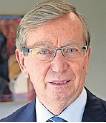ICAC urges ban on secret meetings with lobbyists
Angus Thompson
The corruption watchdog has called on the NSW government to ban secret meetings between lobbyists and public officials, one of many sweeping reforms recommended for the practice of lobbying in the state.
Lobbyists should be explicitly banned from giving gifts to public officials, politicians who meet lobbyists should abide by a code of conduct, and an expanded register should be kept to monitor those who go from government to lobbying, the Independent Commission Against Corruption says.
In its Operation Eclipse report released yesterday, the oversight body argued for a legislative overhaul, saying current safeguards were weak and administered by the NSW Electoral Commission, an agency ill-suited to monitoring transparency of decision-making.
The commission also said local councils faced considerable risk of improper influence and should be regulated by lobbying laws, noting its recent inquiry into the former Canterbury council had revealed close relationships between public officials and lobbyists.
ICAC chief commissioner Peter Hall, QC, said that while lobbying was in the public interest when conducted ethically and honestly, Operation Eclipse and other commission investigations showed that lobbying, access and influence could result in favouritism and corrupt conduct.
‘‘The LOGO [Lobbying of Government Officials] Act, while a step in the right direction, falls short of implementing all of the 17 recommendations made by the commission more than 10 years ago in its previous lobbying investigation, Operation Halifax,’’ Mr Hall said.
The commission said that among the unsubstantiated complaints it received, there was a claim that an MP, who was a close friend of the owner of a third-party lobbyist firm, referred community groups that were seeking funding for projects to the lobbyist. In return, the lobbyist donated to the MP.
The commission has now made 29 more recommendations, including several proposals to prevent secret or undocumented meetings between lobbyists and public officials. The commission said this could be achieved by recording all communications with lobbyists, including those held away from government premises; avoiding discussing material matters with lobbyists in social settings; and increasing the detail in ministerial diary disclosures.
It has also urged the government to appoint a dedicated lobbying commissioner, who would have the ability to focus on regulating lobbying activity and take on the functions recommended in the report.
The report also said: ‘‘The commission’s view is that postemployment restrictions should be considered for a broader range of officials in high-risk categories,’’ adding greater transparency could be achieved by establishing a ‘Former Public Officials’ list.
